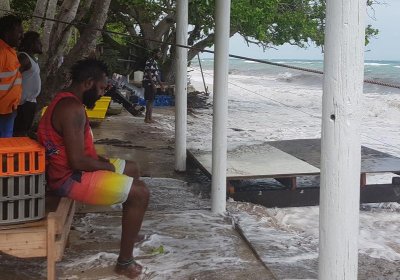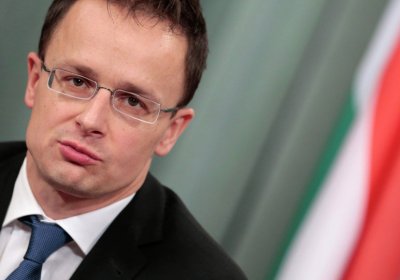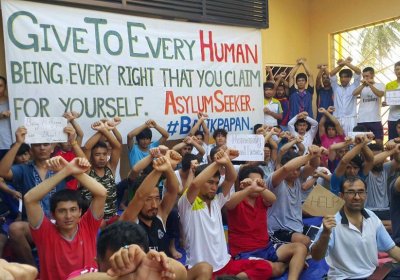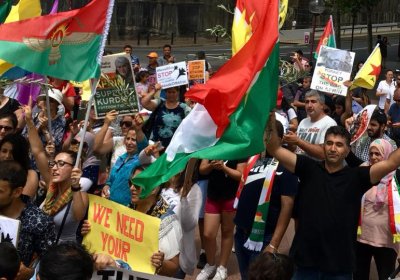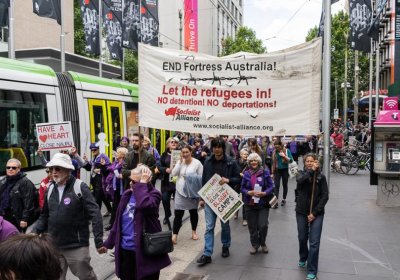Refugee Action Collectives have launched an open letter asking the Minister for Home Affairs Clare O'Neil to help refugees stranded in Indonesia.
United Nations High Commissioner for Refugees (UNHCR)
Tributes to Stewart West were powerfully worded, but hearing Anthony Albanese and Peter Dutton honour him for the kinds of things they mostly do not do made me angry. Emily McGrath looks at the legacy of her late grandfather.
The UNHCR said Australia has violated Torres Strait islanders' rights by ignoring their concerns about rising seas caused by climate change. Binoy Kampmark reports.
Chris Slee reports on a protest calling on the United Nations Human Rights Council to refer Sri Lanka to the International Criminal Court for committing genocide against the Tamil people.
Hungarian foreign minister Peter Szijjarto accused United Nations officials on September 19 of “spreading lies” with their criticism of Budapest’s anti-migration policies.
The comments came just days after new UN High Commissioner for Human Rights, Michelle Bachelet, and UN rights experts harshly criticised Hungary’s immigration policies.
Szijjarto told the UN Human Rights Council in Geneva that “it was obvious” the UN officials were “biased pro-migration officials”.
The climate crisis is the greatest crisis the Earth faces. It threatens the entire ecosystem that all life depends upon.
The refugee crisis is arguably the greatest challenge humanity faces. It affects hundreds of millions of people and is the dominant force shaping politics across the Earth.
Strong arguments can be made for both these statements.
The interlinking nature of the two crises, both practically and politically, is the key to finding real solutions and raises the question: why do the movements seem so separate?
Hundreds of refugee families defied a protest ban in the Indonesian city of Makassar on Sulawesi on February 21.
They marched from their refugee accommodation to the office of the United Nations High Commissioner for Refugees (UNHCR) with banners and placards that read “No one is illegal” “Is there any UNHCR?”. A young girl held up a placard, almost as tall as her, that read “We are forgotten”.
The Turkish government’s attacks on the Democratic Federation of Northern Syria’s (DFNS) Afrin Canton in northern Syria are an attack on refugees.
Four hundred men are still protesting in the Manus Island detention centre. They are calling for nothing less than their freedom and will not move to another centre on the Island. They have held out since the Australian government shut down the centre and removed services on October 31.
November 15 was the 107th consecutive day of protest on Manus Island since the Australian government announced it would close the centre.
The offshore detention hellholes of Nauru and Manus Island are becoming increasingly unviable as more damning reports are published, court cases in Papua New Guinea continue, private service providers under the pressure of boycott campaigns decline to reapply for contracts and protests grow in Australia.
Prime Minister Malcolm Turnbull’s latest plan — third country resettlement in the United States — is a reaction to this pressure, while also maintaining the policy of boat turnbacks, border security rhetoric and denying asylum seekers the right to be resettled in Australia.
Prime Minister Malcolm Turnbull, has used speeches to the UN General Assembly and US President Barack Obama’s leaders’ summit on refugees to push Australia’s “compassionate humanitarian” solutions to the worldwide refugee crisis.
Yes, the country strongly criticised in numerous UNHCR and Amnesty International reports is using the UN General Assembly to proclaim itself a leader in “compassionate” refugee solutions.
Turnbull is using this “solution” as the cornerstone of a bid for Australia to sit on the UN Human Rights Council.
- Page 1
- Next page


